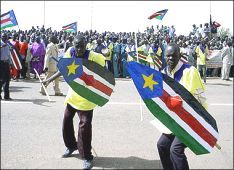SPLM greet thousands of southerners in Khartoum
By Opheera McDoom
KHARTOUM, April 6 (Reuters) – Thousands of cheering southern Sudanese honoured senior former rebel leaders on Wednesday as they held their first political rally in the national capital after a more than two-decade absence.

|
|
Southern Sudanese celebrate in the streets of Khartoum landmark peace deal, ending more than two decades of civil war in southern Sudan, Jan 10, 2005. (AFP) . |
The most high-level delegation from the former southern rebel Sudan People’s Liberation Movement (SPLM) since civil war began in Sudan in 1983 arrived in Khartoum last weekend to begin forming a new coalition government after signing a peace deal in January.
Some southerners in traditional dress carried shields and wore ostrich feathers, but most wore urban attire – jeans and T-shirts – after years of living in the capital, having fled the fierce fighting in the south many years ago.
“Peace, oh yeah, New Sudan, oh yeah,” the crowd of around 10,000 people chanted as SPLM leaders gave speeches.
The delegation head, SPLM Secretary-General James Wani, spoke in Juba Arabic, a dialect spoken in the southern town of Juba.
“Peace has dawned at last in our war-torn nation,” he said. “We have actually come to stay and there’s no turning back.”
Senior SPLM official Yasir Arman, a northerner, said they had come to unite Sudan. “The SPLM did not come here just to take up 10 or 20 ministerial posts. We came here as a movement for change – this is the new Sudan,” he said.
Many in the crowd were ecstatic at the arrival of the delegation, whose first major task will be to form the new constitution.
“We have met them again after 21 years of absence,” Manshur Malwal Kwot, from oil-rich Abyei, said.
“This new government will be one of participation, to include all the groups – not like now.”
The southern civil war broadly pitted the Islamist Khartoum-based government against rebels who were mostly Christian or practiced traditional religions. It was complicated by issues of oil ethnicity and ideology.
The war claimed 2 million lives and forced more than 4 million from their homes.
The United Nations estimates around 2 million refugees, mostly southerners, live in slum housing surrounding Khartoum, with no running water, electricity or sanitation.
NEW SUDAN OR TWO SUDANS?
But not all the crowd were happy with the peace deal signed on Jan. 9, which gives the south a right to a choose secession after 6.5 years, shares wealth and power, sets up joint army units, and decentralises power from Khartoum.
“I don’t want this peace,” said 21-year-old Simon Njok. “I want separation – I’ve lived through a betrayal here in the north.”
When asked if anyone in the crowd would vote for unity in the referendum, there was silence. “No one wants unity. We all want to separate,” said Santino Yel Deng.
The southern peace deal does not affect a separate conflict raging in the western region of Darfur, where the government has accused the SPLM of arming rebel groups who launched an open revolt against Khartoum in early 2003.
Wani said peace was incomplete and the SPLM has a moral and political obligation to find a solution to the conflict.
